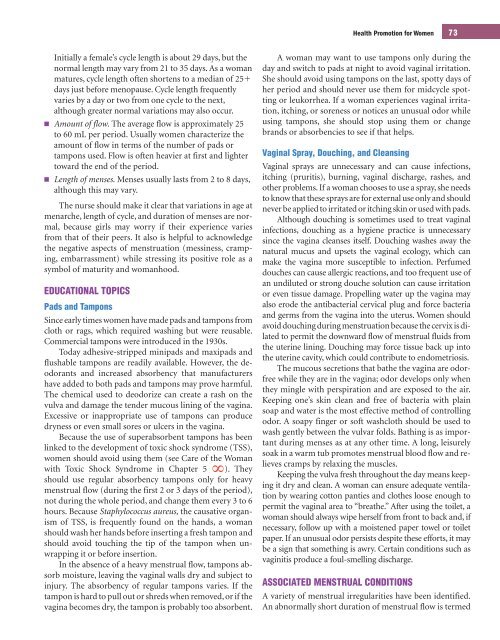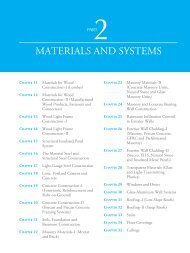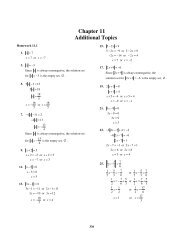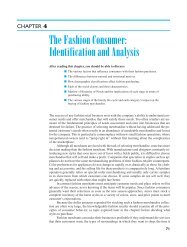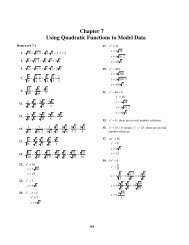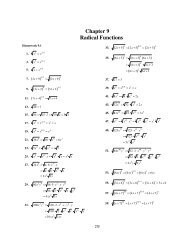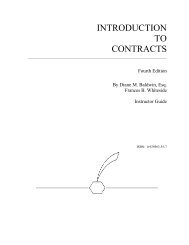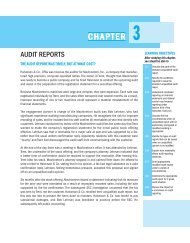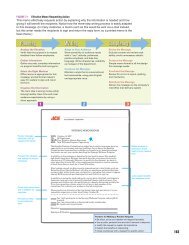Health Promotion for Women - Prentice Hall
Health Promotion for Women - Prentice Hall
Health Promotion for Women - Prentice Hall
You also want an ePaper? Increase the reach of your titles
YUMPU automatically turns print PDFs into web optimized ePapers that Google loves.
lon23944_ch04.qxd 2/10/06 6:46 PM Page 73<br />
Initially a female’s cycle length is about 29 days, but the<br />
normal length may vary from 21 to 35 days. As a woman<br />
matures, cycle length often shortens to a median of 25�<br />
days just be<strong>for</strong>e menopause. Cycle length frequently<br />
varies by a day or two from one cycle to the next,<br />
although greater normal variations may also occur.<br />
■ Amount of flow. The average flow is approximately 25<br />
to 60 mL per period. Usually women characterize the<br />
amount of flow in terms of the number of pads or<br />
tampons used. Flow is often heavier at first and lighter<br />
toward the end of the period.<br />
■ Length of menses. Menses usually lasts from 2 to 8 days,<br />
although this may vary.<br />
The nurse should make it clear that variations in age at<br />
menarche, length of cycle, and duration of menses are normal,<br />
because girls may worry if their experience varies<br />
from that of their peers. It also is helpful to acknowledge<br />
the negative aspects of menstruation (messiness, cramping,<br />
embarrassment) while stressing its positive role as a<br />
symbol of maturity and womanhood.<br />
EDUCATIONAL TOPICS<br />
Pads and Tampons<br />
Since early times women have made pads and tampons from<br />
cloth or rags, which required washing but were reusable.<br />
Commercial tampons were introduced in the 1930s.<br />
Today adhesive-stripped minipads and maxipads and<br />
flushable tampons are readily available. However, the deodorants<br />
and increased absorbency that manufacturers<br />
have added to both pads and tampons may prove harmful.<br />
The chemical used to deodorize can create a rash on the<br />
vulva and damage the tender mucous lining of the vagina.<br />
Excessive or inappropriate use of tampons can produce<br />
dryness or even small sores or ulcers in the vagina.<br />
Because the use of superabsorbent tampons has been<br />
linked to the development of toxic shock syndrome (TSS),<br />
women should avoid using them (see Care of the Woman<br />
with Toxic Shock Syndrome in Chapter 5 ∞ ). They<br />
should use regular absorbency tampons only <strong>for</strong> heavy<br />
menstrual flow (during the first 2 or 3 days of the period),<br />
not during the whole period, and change them every 3 to 6<br />
hours. Because Staphylococcus aureus, the causative organism<br />
of TSS, is frequently found on the hands, a woman<br />
should wash her hands be<strong>for</strong>e inserting a fresh tampon and<br />
should avoid touching the tip of the tampon when unwrapping<br />
it or be<strong>for</strong>e insertion.<br />
In the absence of a heavy menstrual flow, tampons absorb<br />
moisture, leaving the vaginal walls dry and subject to<br />
injury. The absorbency of regular tampons varies. If the<br />
tampon is hard to pull out or shreds when removed, or if the<br />
vagina becomes dry, the tampon is probably too absorbent.<br />
<strong>Health</strong> <strong>Promotion</strong> <strong>for</strong> <strong>Women</strong> 73<br />
A woman may want to use tampons only during the<br />
day and switch to pads at night to avoid vaginal irritation.<br />
She should avoid using tampons on the last, spotty days of<br />
her period and should never use them <strong>for</strong> midcycle spotting<br />
or leukorrhea. If a woman experiences vaginal irritation,<br />
itching, or soreness or notices an unusual odor while<br />
using tampons, she should stop using them or change<br />
brands or absorbencies to see if that helps.<br />
Vaginal Spray, Douching, and Cleansing<br />
Vaginal sprays are unnecessary and can cause infections,<br />
itching (pruritis), burning, vaginal discharge, rashes, and<br />
other problems. If a woman chooses to use a spray, she needs<br />
to know that these sprays are <strong>for</strong> external use only and should<br />
never be applied to irritated or itching skin or used with pads.<br />
Although douching is sometimes used to treat vaginal<br />
infections, douching as a hygiene practice is unnecessary<br />
since the vagina cleanses itself. Douching washes away the<br />
natural mucus and upsets the vaginal ecology, which can<br />
make the vagina more susceptible to infection. Perfumed<br />
douches can cause allergic reactions, and too frequent use of<br />
an undiluted or strong douche solution can cause irritation<br />
or even tissue damage. Propelling water up the vagina may<br />
also erode the antibacterial cervical plug and <strong>for</strong>ce bacteria<br />
and germs from the vagina into the uterus. <strong>Women</strong> should<br />
avoid douching during menstruation because the cervix is dilated<br />
to permit the downward flow of menstrual fluids from<br />
the uterine lining. Douching may <strong>for</strong>ce tissue back up into<br />
the uterine cavity, which could contribute to endometriosis.<br />
The mucous secretions that bathe the vagina are odorfree<br />
while they are in the vagina; odor develops only when<br />
they mingle with perspiration and are exposed to the air.<br />
Keeping one’s skin clean and free of bacteria with plain<br />
soap and water is the most effective method of controlling<br />
odor. A soapy finger or soft washcloth should be used to<br />
wash gently between the vulvar folds. Bathing is as important<br />
during menses as at any other time. A long, leisurely<br />
soak in a warm tub promotes menstrual blood flow and relieves<br />
cramps by relaxing the muscles.<br />
Keeping the vulva fresh throughout the day means keeping<br />
it dry and clean. A woman can ensure adequate ventilation<br />
by wearing cotton panties and clothes loose enough to<br />
permit the vaginal area to “breathe.” After using the toilet, a<br />
woman should always wipe herself from front to back and, if<br />
necessary, follow up with a moistened paper towel or toilet<br />
paper. If an unusual odor persists despite these ef<strong>for</strong>ts, it may<br />
be a sign that something is awry. Certain conditions such as<br />
vaginitis produce a foul-smelling discharge.<br />
ASSOCIATED MENSTRUAL CONDITIONS<br />
A variety of menstrual irregularities have been identified.<br />
An abnormally short duration of menstrual flow is termed


